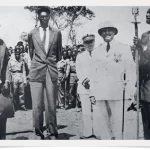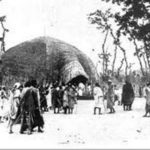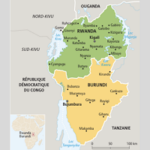The Missionaries, the Court, and the Local community, 1904-1910
Inkehwe ikubitirwa mukwayo. [A man without a protector is beaten up to the door of his own house.]
In the struggle for power at the Court, Kabare could argue that although Ruhinankiko had mustered European support at critical junctures, he had not managed to restrain the growth of European power. While the Court was occupied with internal dissensions, by the end of 1903 the Fathers had established three more stations in addition to those existing in Save and Zaza, one without the Court’s consent. The three, Nyundo, Rwaza, and Mibirizi, were all distant from the Court at Nyanza, but in combination with Save and Zaza they formed a chain encircling the kingdom. Besides supporting enemies of the Court like Mpumbika, the missionaries had gone so far as to expel several notables from the domains they had received from the Court. The Fathers then appointed replacements of their own choice or assumed command of the domain themselves. On such an occasion, one Father commented that rule by the missionaries could give nothing but satisfaction to “these poor people.” He continued: “Certainly no harm could come from this transfer of authority into the hands of a true Father of a religion whose motto is Justice and Fraternity. By 1904 word of the power of the Fathers had spread even to Burundi and the Congo, where rulers facing difficulties sent pleas for help to stations in Rwanda.
As Kabare’s influence with Kanjogera grew, he persuaded her that the Court must act more vigorously against the missionaries. When the Fathers at Zaza placed a catechist in Buganza, an area of easternRwanda highly prized by the Court for its fine pastures and its historical associations with the birth of the dynasty, the Court immediately demanded an explanation of this action, which had been taken without its consent. The Fathers answered in a conciliatory fashion that they did not plan a permanent establishment in the area, so the Court let the matter drop temporarily. But when the catechist continued his preaching, Kabare ordered his house burned and the teacher driven out. At about the same time, the Court dispossessed Mpumbika, indicating to the Fathers that it was planning to take a firmer stand against their clients. Even Kabare was forced to acknowledge the impossibility of an outright attack on the well-guarded missions. Instead, in February 1904, he began a campaign of harassing messengers and caravans traveling to the missions: this hampered the work of the Fathers while warning Rwandans that the Court disapproved of any association with them.
The Court resented the arrival of foreign traders – European, Arab, Indian, and East African-as much as it did the installation of themissionaries. Until the mid-nineteenth century, foreign traders had been excluded from Rwanda and had had to exchange their goods at the frontier. Musinga’s father, Rwabugiri, had permitted a certain number of East African traders, known as basumbwe, to enter the kingdom and to trade after having paid tribute to the Court. At the beginning of Musinga’s reign, the Court still regarded the right to trade as a grant it gave to its clients, Rwandan or foreign, and from which it could draw a profit. Even transactions among Rwandans at the few Court-established markets in the northwest and southwest were supervised and taxed by Court appointees. Not understanding or not wishing to recognize the Court’s prerogative, the Germans did not require traders who entered Rwanda after the establishment of the protectorate to observe the customary procedures. Nor did they impose regulations of their own: in their eyes, Rwanda was open t0 all who cared to trade there. By 1904 several hundred traders had come to take advantage of the opportunities.
Some of the caravan leaders, especially the Europeans, visited the Court on their own initiative, either because they wanted an escort to requisition provisions for them en route or because they realized the Court had accumulated the greatest concentration of resources with which to buy goods. But many of the smaller traders held that the potential aid or purchases by the Court would be outweighed by the demands that it would make in return. They avoided Nyanza altogether. Caravan leaders who did not secure Court representatives to accompany them sometimes traded for the supplies they needed, but more often they simply expropriated provisions from the local people. Traders who hoped to sell cloth or beads in return for cattle or cattle hides found that most Rwandans valued their cade more than the foreign goods. To stimulate the desire to trade, the foreigners resorted to force or threat of force. As a German official commented, the Rwandans had no defense against the demands of the traders unless they were ready to use violence themselves. Many of the East African traders were from Buganda and were at least nominal Christians; they usually sought shelter at themissions and then made use of their link to the Fathers ta extract more provisions or to force more trade with the reluctant people of the area.
Troubled though Rwandans were by persistent and demanding traders, they never suffered the ravages of large-scale slave trading. Rwandans had long kept in bondage some of their fellow countrymen or foreigners captured in war. But generally they treated these servants (known as baja) well, sometimes adopting them into their families. During the reign of Rwabugiri a limited trade in slaves from west of Lake Kivu and from –northwestern Rwanda began to develop. Some East Africans and Arabs came to buy slaves at a market at Kivumu in north-central Rwanda, but they never made raids of their own to obtain victims.As elsewhere in Africa, the trade was most vigorous during times of famine, when people were obliged to sell others to obtain food for themselves. Occasionally Rwandans sold children from their own households or lineages, but such a sale was condemned by the rest of the community. More often the victims were strangers or orphans with no kin to protect or avenge them. Although some of the traders may have paid court to the mwami, they apparently did so as general traders rather than as slave traders. The Court, at least under Musinga, did not acknowledge that the trade existed within the kingdom. Rwandans regarded the traffic as shameful, to be carried on as privately as possible, Tutsi notables, however, sometimes aided the traders in making purchases in return for part of the profits.
Because external traders who disregarded the authority of the Court had first dared enter Rwanda in the wake of the Germans, and because many of them found refuge with the Fathers, the Court saw them as clients of the Europeans. Like messengers and porters traveling to the missions, these clients were far more vulnerable than the Europeans themselves. Hoping both to frighten the traders into leaving Rwanda and to demonstrate its resentment at the traders’ patrons, the Court began attacking East African, Arab, and Indian traders in May 1904. By the following September, between one and two hundred traders (and their servants and wives) had been killed and all their goods pillaged.The district officer, Captain von Grawert, was in Rwanda at the time of the first attack. As yet unaware of the abuses committed by the traders, he retaliated against the Rwandans who had assailed them, pillaging and burning homes and crops for two days. While von Grawert was at Nyanza, however, the Court won him over to its position; when he returned to Rwanda in June and July, he refused to aid traders who had survived Rwandan attacks or to punish the Rwandans who had assailed them. As von Grawert’s refusal to support “his men” became known throughout the kingdom, Rwandans interpreted it as a victory for the Court. Probably with the encouragement of the Court, some spread the story that von Grawert had become a mugaragu(client) of Musinga and would henceforth do his bidding. The longer and further the story circulated, the more fantastic it grew: some related that the Court had actually killed the German officer.
https://uk.amateka.net/the-missionaries-the-court-and-the-local-community-1904-1910/https://uk.amateka.net/wp-content/uploads/2020/07/colon.jpghttps://uk.amateka.net/wp-content/uploads/2020/07/colon-150x150.jpgMissionary historySocial & cultureInkehwe ikubitirwa mukwayo. In the struggle for power at the Court, Kabare could argue that although Ruhinankiko had mustered European support at critical junctures, he had not managed to restrain the growth of European power. While the Court was occupied with internal dissensions, by the end of 1903 the...BarataBarata rpierre@ikaze.netAdministratorAMATEKA | HISTORY OF RWANDA



